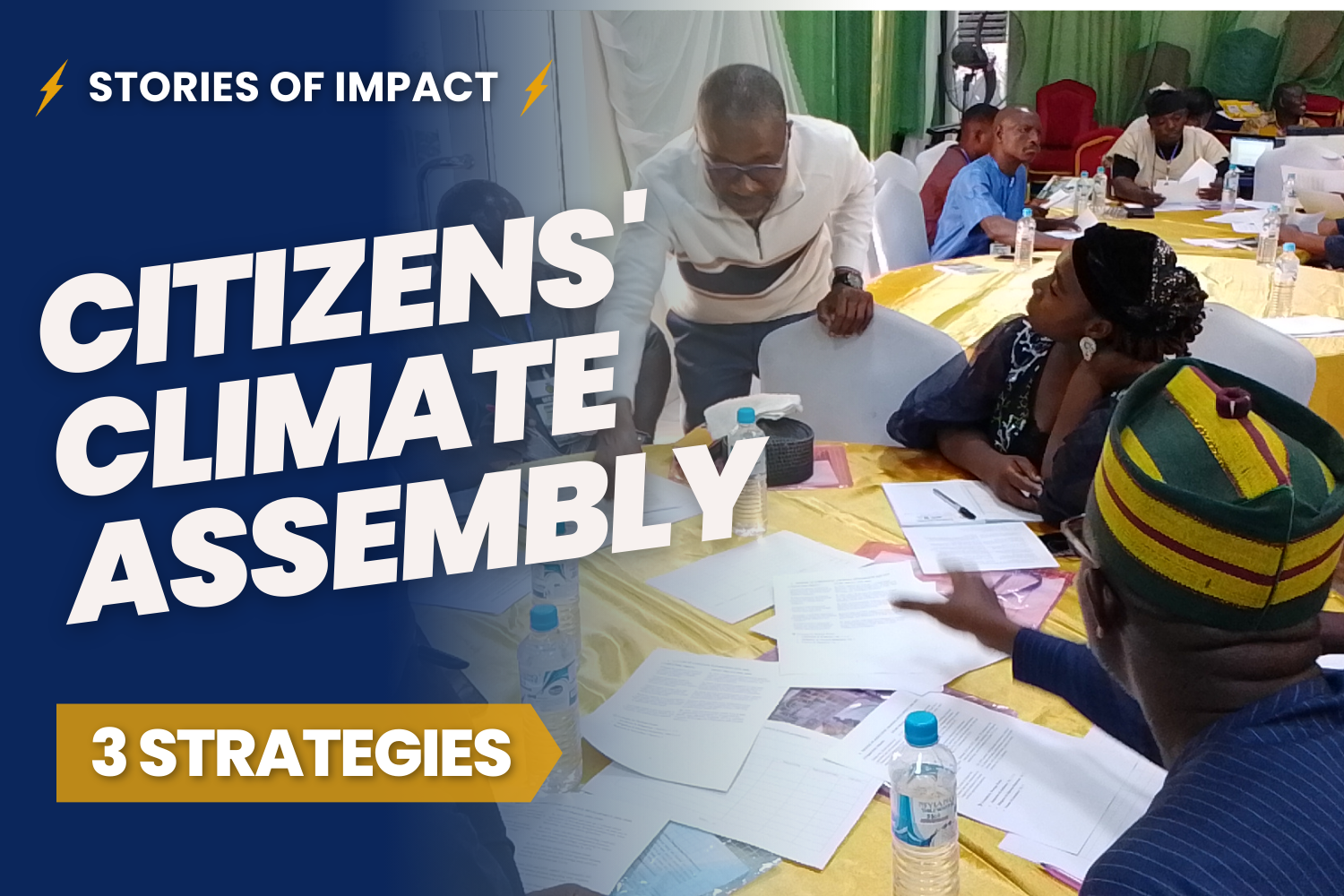3 big participatory climate action initiatives from Brazil, Nigeria & Canada
/By Zoë Wilkins
We’ve been reflecting on the 45 coalitions of climate justice organisations and policymakers we’ve worked with through the Climate Democracy Accelerator. In 41 different communities around the world, these teams have been forging new ways of responding to the climate crisis while testing new forms of participatory democracy to make sure every voice is included from the outset.
Following up on these initiatives, we’ve heard stories of increased community resilience, new relationships between citizens and governments, and innovative climate solutions ranging from regenerative agriculture to redesigning transport systems with young people. We highlight a few recent initiatives of members of the People Powered climate democracy network below.
Delibera Brazil, Cohort 3: Blending climate assemblies and legislative theatre
In November, the team from Delibera Brasil shared their design to build on the first climate assembly in the Amazon cities of Brazil through youth-focused legislative theatre. They originally selected the city of Bujaru, in Pará, because of its biodiversity and its implications within the bioeconomy of the region, alongside the already acute impacts of the climate crisis in the city.
In February, the final recommendations were delivered by the assembly to the local government, and this month they held their first legislative theatre session. The legislative theatre process is intended to include young people, building on the assembly’s recommendations, to bring democracy to life.
They will explore their experiences of life in the Amazonian city, the ways it is already changing, and work to create policy to shape its future. Watch their video below to hear more about how the process is going so far!
The Climate Reality Project Canada, Cohort 5: Climate Participatory Policy-Making
The Climate Reality Project Canada, a participant in the current cohort of the Climate Democracy Accelerator, released a new report yesterday on advancing climate action through participatory democracy.
To launch the report, the team organised a webinar to spotlight ongoing efforts and key evidence about how to effectively use the tools of participatory democracy to create more equitable climate action. The launch included People Powered member Urban Ecology Centre, who shared lessons learned and insights from Montreal’s participatory budgeting, alongside SFU’s Centre for Dialogue, which presented their work on the Burnaby Community Assembly.
Through the Climate Democracy Accelerator, the Climate Reality Project Canada team will be spending the next five months designing their own participatory climate democracy initiative to build out effective climate policy with residents from the city’s Community Energy Investment Roadmap.
Fundlink Aid International, Nigeria, Cohort 4: Participatory Climate Adaptation
Fundlink Aid International is running the first Plateau State Climate Assembly in Abuja, supported by People Powered as well as the Open Government Partnership. The team completed the Climate Democracy Accelerator at the end of March, sharing their initiative in a final session with the rest of the cohort focused on their action plans.
Plateau State, located in the north-central region of Nigeria, faces various climate-related challenges, including droughts, erratic rainfall patterns, and severe flooding. These issues disproportionately affect marginalized groups such as rural farmers, herders, women, and displaced persons.
These groups contribute the least to climate change but endure most of its adverse impact, exacerbating their existing socioeconomic inequalities and fueling resource-based conflicts. Despite these challenges, Plateau State lacks a comprehensive climate change policy to guide mitigation and adaptation efforts.
One month in, they are now recruiting for the climate assembly and sharing their tools with cohort members as they develop them. The assembly will comprise 40 members of the public, and its central outcome will be a state-level climate change policy. Fundlink Aid is working alongside the Plateau State Ministry of the Environment, alongside the Federal Ministry of the Environment’s ongoing efforts to support the development of local climate change policy.
Looking forward
Participatory democracy offers a real opportunity for opening up decision-making on the climate crisis. Not just asking people to consult, but inviting them to shape decisions on the issues they live through the impacts of from the get-go.
In a moment that is feeling increasingly polarized, creating space to connect, to discuss, and to build relationships with those around is fundamental. By including people who experience the impacts of the climate crisis most acutely, we not only build a social and democratic fabric but also design better solutions for all.
Read more participatory climate impact stories:














